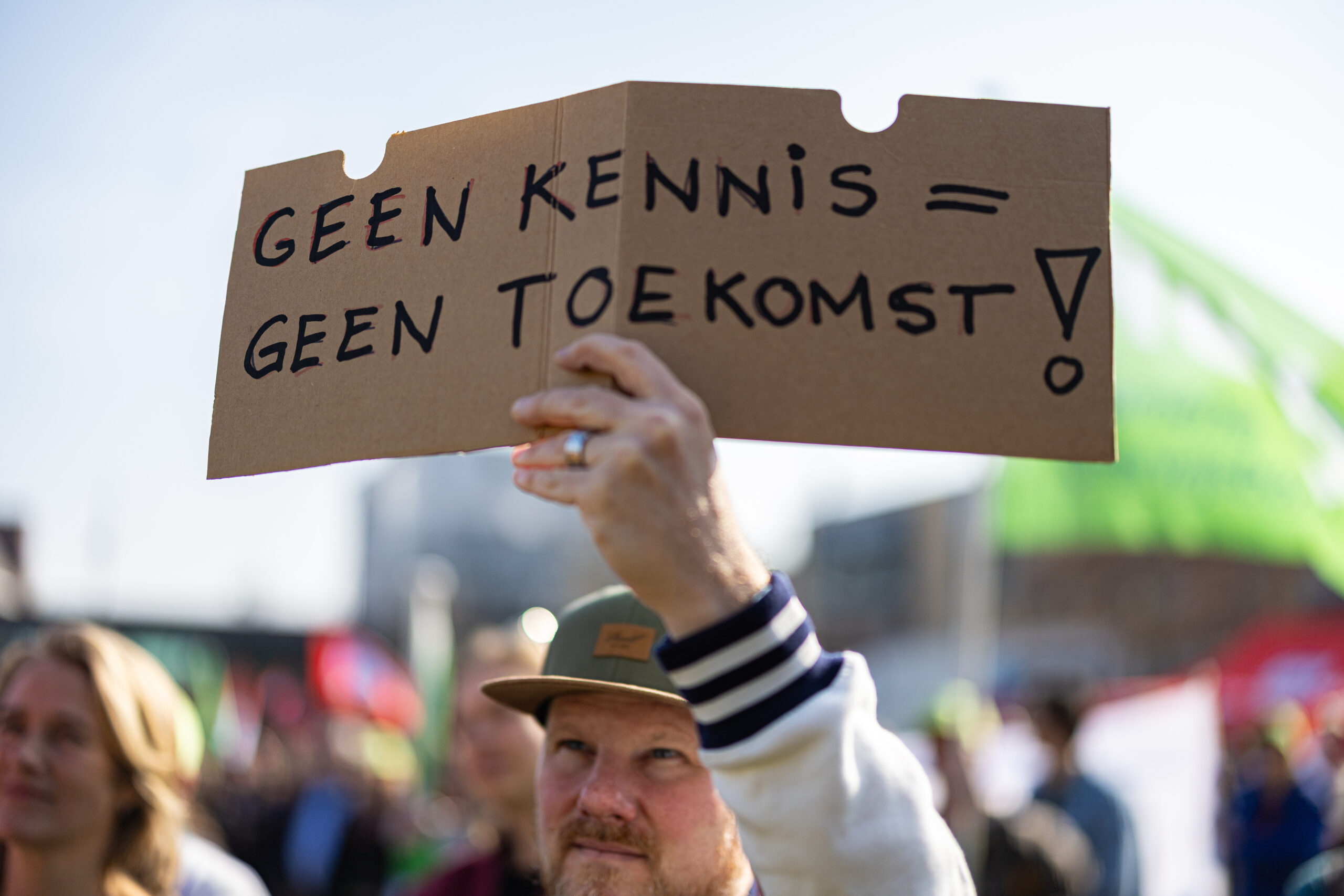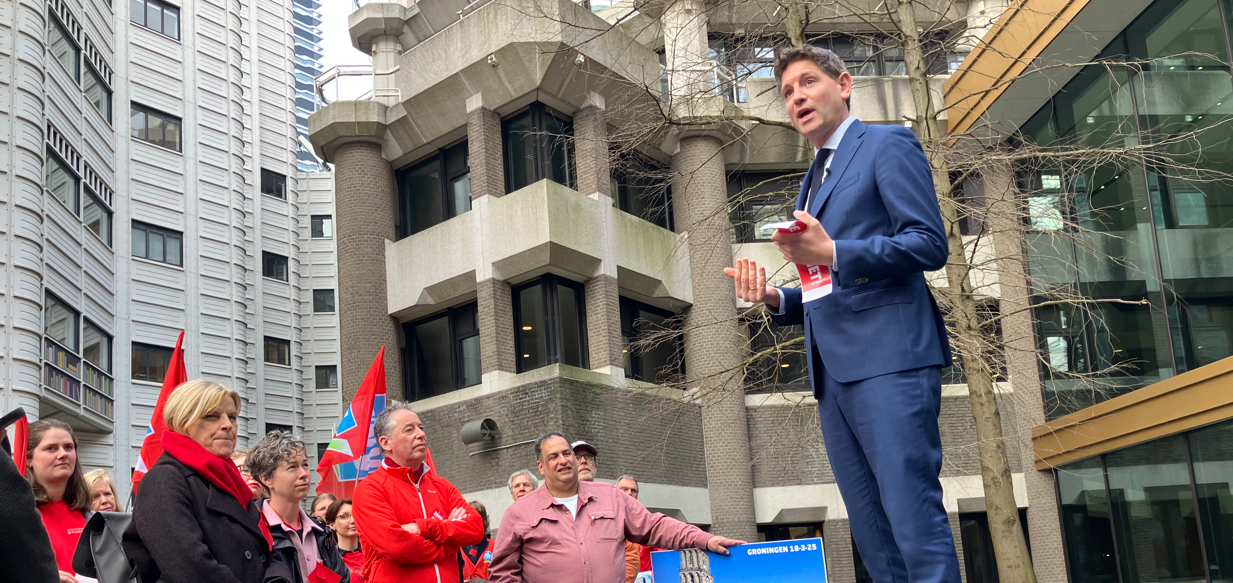Text Marieke Enter, Dominique Vrouwenvelder, Luuk Zegers and Roelof Kleis
The Dutch government will only reveal more details about its plans for higher education next week, on Budget Day. But it is already clear the sector needs to prepare for substantial cutbacks. WUR has accordingly announced its intention to make cuts of 80 million euros initially. That news has people worried, as Resource has discovered.What will the cuts mean for education, employment and the pressure of work at Wageningen?
Shortly before the summer holidays, WUR announced it would need to make cuts ‘due to the changing financial context’. The first step will be to make savings of 80 million euros by ‘critically assessing the expenditure this year’ and by ‘reducing the overall budget for expenditure in 2025 by five per cent’, explained Executive Board member Rens Buchwaldt in a message on the intranet.
Other universities have also announced cuts, and have even taken concrete measures in some cases. For example, the University of Twente has stopped using student-assistants. All these announcements have prompted some worried reactions. What impact will the cutbacks have on teaching, jobs and work pressure in Wageningen (Resource will look at research at a later date)?
Modest target
The cuts that have been announced will probably only have a marginal effect on teaching, says Dean of Education Arnold Bregt. ‘The Executive Board asked whether a million euros could be cut in the cost of the courses we teach. That applies to the budget for 2025-2026. The budget for this academic year has already been fixed.’
According to Bregt, the target for the cutbacks is modest. One million euros in the budget for teaching courses amounts to cuts of 1.6 per cent. That is much less than the overall target of five per cent announced by the Executive Board.
Bregt says the reason the target for teaching has been specified already has to do with the method for determining the teaching budget. ‘The budget for 2025-2026 has to be finalized in April next year. That money is only paid out in 2027. If you don’t take action now, you will be too late. The degree programme directors have already been informed, and are now looking at how to implement the cuts.’
Not all degrees will be affected by the cutbacks. Bregt: ‘We won’t be making minor, across-the-board cuts. Degree programmes that got extra funding in the previous budget cycle because they needed strengthening will be exempt. It wouldn’t be right to first give them extra money and then take it away again. The other programmes will have to find savings of 1.6 per cent, in proportion to the size of the programme.’
Not the same for less
Biology programme director Marjolein Coppens agrees that cuts of 1.6 per cent in teaching is not that bad relatively speaking. ‘I think the chair groups will manage that. But given this government, I expect more cuts in the future. The programme committee will then need to look carefully at what is essential and what not. We can also consider options for merging courses, for example. We need to make sure that if we cut costs, we therefore stop doing certain things, rather than doing the same for less money.’
We are using the cuts for a major overhaul
Bregt sees the target for cuts as a good opportunity to take a critical look at the current range of course. ‘We will be using it as a reason for a major overhaul. Some of the courses have become very expensive. We discussed this with the programme directors and I didn’t hear many complaints. This is largely accepted. It’s true we know we have to find savings. Money has constantly been added over the past few years to keep the courses up to standard.’
Bregt says the cutbacks target will not be used as an excuse to abolish less profitable degree programmes. ‘The new Strategic Plan announces an analysis of the degree portfolio but that is separate to these cuts. We will be reviewing the degrees on offer. At least, if the consultative bodies agree to the Strategic Plan.’
No fat left to trim
Edith Feskens, professor of Global Nutrition in the Agrotechnology & Food Sciences Group (AFSG) and responsible for the finances of the cluster group, fears WUR will not be able to avoid taking university-wide unwelcome measures. ‘Eighty million is 10 to 15 per cent of the overall WUR budget. It’s not unfeasible but it’s still an awful lot of money. And we don’t exactly have a lot of fat left to trim. That applies to all the chair groups.’
She does add the cuts can’t be blamed entirely on the government. ‘The collective labour agreements mean we are now paying 12 per cent more in wages than two years ago. If the funding doesn’t keep pace with that, you have to cut back on overheads.’
The collective labour agreements mean we are now paying 12 per cent more in wages than two years ago
Feskens hopes WUR will keep a sharp eye on the balance between what is essential and what is merely nice to have. ‘WUR has a governance model in which chair groups have to earn money by teaching students, getting PhD bonuses and carrying out projects at decent rates. If you cut back on that, you will also have less income. I also hope we don’t undermine the measures to combat work pressure.’
Low-hanging fruit
Nicole Jacobs is head of Practical Support at Facilities & Services and the person who will have to deal with teaching cuts that affect practicals. She does see room for cutbacks. ‘As support staff for practicals, we have been trying to save on materials and equipment for some years now for sustainability reasons. That means in effect we are ahead of the game in making cuts.’ She agrees you can’t save on materials and equipment indefinitely. ‘Eventually I will need to review our support activities. We want to reduce the burden for teachers wherever possible, but that becomes more difficult if we have less money available. It would mean some tasks get handed back to the teachers, even though they already have a big workload.’
I hope we don’t undermine the measures to combat work pressure
One area where cuts are almost impossible, as Resource has heard from various quarters, concerns the excursions and field trips. That is partly because the amount of time reserved for fieldwork has fallen a lot anyway in recent years. For example Jeroen Schoorl, associate professor of Geomorphology and Landscape Evolution Modelling, says one of his foreign excursions has been reduced from 24 effective excursion days 20 years ago to 13 days now, while a field trip has gone from 6 weeks to 27 days. He warns: ‘If the pandemic has taught us anything, it is that students’ fieldwork knowledge and skills really suffered during the Covid period. All geographical and environmental programmes in the Netherlands found that. There is no more slack.’
There is nothing to trim in the excursions
Hydrology lecturer Roel Dijksma, who is just back from Iceland, shares Schoorl’s concerns. ‘Over the years, we have already trimmed what we could off the fieldwork courses. There is no low-hanging fruit left for the cutbacks; whatever you choose will hurt. Making the trips even shorter is not an option. That automatically means scrapping elements, which will be at the expense of the learning objectives.’
He continues: ‘We are still trying to find some way of cutting back on the expenditure without it affecting the quality. But without success so far. For example, our only option for the Iceland excursion was to reduce the number of students by setting a maximum, with priority for “our own people”. But that means people who aren’t in the priority group only know whether there is room for them after the deadline has passed. You can imagine how difficult it is to decide on your Master’s courses in those circumstances.’
No uni-wide recruitment freeze
As Buchwaldt announced on the intranet, decisions about cuts will inevitably affect staffing as personnel expenses account for 70 per cent of WUR’s costs. So far, there have been no consequences for recruitment, says Recruitment manager Johan Kanis. ‘The Recruitment department doesn’t decide whether to advertise job vacancies or renew temporary contracts; that is up to the directors. The Executive Board hasn’t announced a recruitment freeze either. Each entity within the organization decides for itself how to achieve the required cuts. Having said that, more consideration goes into whether to open up a vacancy now. The number of vacancies has been falling for a while as everyone is being careful with their budget. We hired a lot of new people over the past few years. We won’t be keeping up those numbers any more. But we still have 80 jobs advertised at present. There will always be jobs available: we’re a big organization and the labour market is tight. That’s why we also recruit abroad.’
Tips welcome
Resource will be following the cutback operation over the next while. The editorial board is interested in hearing about examples or situations that would benefit from journalistic attention.

 Illustration Valerie Geelen
Illustration Valerie Geelen 
